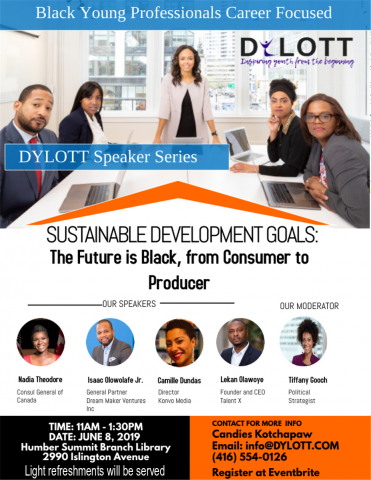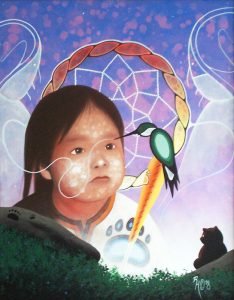Ontario
You are here
Sustainable Development Goals: The Future is Black, from Consumer to Producer
11:00am to1:30pm
Humber Summit Branch Library
2990 Islington Avenue
Are you a Young Black Professional? DYLOTT (Developing Young Leaders of Tomorrow, Today) is inviting you to join us to learn how our community can influence International Diplomacy, Emerging Markets and Social Media.
The event will feature a panel discussion with Consul General Nadia Theodore, Isaac Olowolafe, Camille Dundas and Lekan Olawoye. Moderated by Tiffany Gooch.
There will be a Networking Opportunity following the panel discussion.
Register for Sustainable Development Goals: The Future is Black, from Consumer to Producer
Building Our Way Out of Our Affordable Housing Crisis: What B.C. Can Teach Us About Maximizing the Affordable Housing Potential of Public Land and Non-Profit Assets?
2:00pm to 4:30pm
University of Toronto
100 St. George Street
Sidney Smith Hall: 2nd Floor Auditorium
Room 2102
Something exciting is happening in British Columbia: thousands of units of non-market affordable rental housing are being built in and around Vancouver through an innovative new model of affordable housing development. Not reliant on senior government funding or ongoing operating subsidies, the model is built on a unique partnership with the City, non-profits, and social finance institutions.
Meanwhile, the City of Toronto has identified 11 sites of public land for development, the Port Lands will become developable within the next 10 years, and there are non-profits with land & building assets across the city trying to figure out what to do with them. Can B.C. show us a way to seize these opportunities to solve Toronto’s affordable housing crisis?
Register for Building Our Way Out of Our Affordable Housing Crisis
Thom Armstrong, Executive Director of the Co-op Housing Federation of BC (CHF BC), and one of the key architects of B.C’s model, in conversation with Debbie Stewart, Vice President of Partnerships with the Canadian Mortgage and Housing Corporation (CMHC), will discuss the model and his experience in Vancouver with a focus on the possibilities for Toronto.
This event will bring together City of Toronto staff, non-profit and public housing providers/agencies, non-profit developers, social finance institutions/foundations, co-op housing members, university administrators, churches, housing researchers, housing policy experts, and affordable housing advocates to discuss the opportunities, challenges and steps that can be taken today to start moving towards realizing our affordable housing potential.
The Theory, Practice and Potential of Regional Development: Key Learnings & Policy Recommendations
2:00pm to 3:00pm Eastern Time
Canadian regional development today involves multiple actors operating within nested scales from local to national and even international levels. Recent approaches to making sense of this complexity have drawn on concepts such as multi-level governance, relational assets, integration, innovation, and learning regions. These new regionalist concepts have become increasingly global in their formation and application, yet there has been little critical analysis of Canadian regional development policies and programs or the theories and concepts upon which many contemporary regional development strategies are implicitly based. This webinar highlights the results of five years of cutting-edge empirical and theoretical analysis of changes in Canadian regional development and the potential of new approaches for improving the well-being of Canadian communities and regions, with an emphasis on rural regions. Specific key learnings and policy recommendations will be highlighted
Register for The Theory, Practice and Potential of Regional Development
PANELISTS
David J.A. Douglas is a Professor Emeritus at the University of Guelph, Canada, and has extensive experience in rural development across most Canadian regions, the EU, and other contexts (e.g., Indonesia, Iran, Ukraine, Pakistan).
Ryan Gibson is the Libro Professor of Regional Economic Development at the University of Guelph. His research interests include rural development, governance, and philanthropy.
Sean Markey is a Professor, and registered professional planner, with the School of Resource and Environmental Management at Simon Fraser University, Canada.
Sarah Minnes is a Research Associate and registered planner, with the School of Environment and Sustainability, University of Saskatchewan, Saskatoon, Canada.
Bill Reimer is a Professor Emeritus at Concordia University in Montréal, Canada. From 1997 to 2008, he directed a Canadian research project on the New Rural Economy which included 13 universities, 35 partners, and 32 rural communities from all parts of Canada.
Kelly Vodden is Associate Vice-President (Grenfell) Research and Graduate Studies and Professor (Research) with the Environmental Policy Institute at Grenfell Campus, Memorial University, Corner Brook, Canada.
Worker Co-ops 101: Part 2
12:00 noon Eastern Time
This two-part, interactive series is designed for people who are working in a worker co-op. They are most appropriate for those who have recently become members or who are thinking of applying to join their co-op, but anyone involved in a worker co-op is welcome to participate. Part I will cover basic definitions, statistics on the movement, and the co-op principles as applied to worker co-ops. Part II will cover governance and management principles in a worker co-op, and provide information about CWCF.The webinars will be presented by Peter Hough. Peter has over 30 years of experience as a member, manager, and/or director of worker and consumer co-operatives. He has assisted with many co-operative start-ups, developing bylaws, conducting training programs, completing feasibility studies and business plans as well as providing post-start-up mentoring. He is a director of the Canadian Co-operative Investment Fund which will invest in co-operative in all regions of Canada and a director of Sustainability Solutions Group Worker Co-op and CoopZone Developers’ Network. He was the lead developer and founding Course Director of the CoopZone Co-op Development online training programs, the Financial Officer of the Canadian Worker Co-op Federation, and the Fund Manager of “Tenacity Works” the CWCF’s revolving loan fund.
Leading Effective Meetings Rick Proven: Part 1: June 5, 12:00 noon ET; Part 2: June 11, 12 noon ET.
Have you ever wondered why meetings can some times wander off in all directions?
Why discussions on important issues can just keep going in circles and never seem to get resolved?
This webinar will give you some insights into how we think and process information, then present some models that can be used to keep discussions on track and arrive at decisions that can be supported by the whole group.
In the first one hour session we will:
Have a discussion on human cognitive processes and how they affect our conversations and decision making,
Introduce a tool for planning focused questions to plan the conversations and have an opportunity to practice the model between sessions.
In the second session we will:
Discuss the use of the focus question planning tool which was practiced between sessions,
Introduce and practice the second tool called ORID, Objective, Reflective, Interpretive and Decisional. This tool allows us to take a deep dive into how to plan the conversation, which allows all participants the chance to be part of the discussion and decisions.
The webinar will be presented by Rick Proven. Rick is an adult educator and worker cooperative member. After 32 years in the federal public service Rick retired from Parks Canada in 2010. He held various positions such as human resource advisor, program manager, project coordinator, informal conflict management advisor and national trainer. Through continuous learning and application, Rick has become an effective facilitator and trainer.
Rick now works as a private consultant focusing on facilitation design and training. He also spends his time as a member of a worker cooperative, building energy efficient and net zero buildings.
Democracy at Work Institute Webinars
The Democracy at Work Institute (DAWI) was created by the U.S. Federation of Worker Cooperatives (USFWC) to ensure that worker cooperative development in economically and socially marginalized communities is adequately supported, effective, and strategically directed. The School of Democratic Management, a program of DAWI’s, provides tools workplaces can use right away to build the culture they need.
A recently signed Memorandum of Understanding between DAWI and CWCF allows CWCF members to receive a 50 percent discount on School of Democratic Management webinars. Email Kaye Grant, Communications and Member Services Manager, at communications@canadianworker.coop to receive the discount code if you wish to attend an upcoming webinar. Here are some of the ones scheduled for the coming months.
Working Together on Decolonization
Innovation Works, London Life Solutions Lab
201 King Street
Amanda L Kennedy, Haudenosaunee from the Oneida Nation of the Thames, Bear Clan; was a colonized, marginalized Indigenous child and youth of yesterday, and is an Indigenous Child and Youth Advocate today as well as a Social Entrepreneur and the Founder of Yotuni “Its Growing” Social Enterprise.
Based on her Indigenous ways of knowing which is based on various cultures and tradtions as well as personal experiences, Amanda will be holding a Sharing Circle that will be opened with a prayer acknowledging Mother Earth and all of creation and a smudge using Sage, one of the 4 Sacred Medicines.
Register for Working Together on Decolonization
Amanda will be sharing her wisdom and teachings on some Indigenous truth and issues of the past and present. This will be followed by teachings that helped her on her journey such as the Anishinaabe Teaching on the Seven Grandfather Teachings, Four Sacred Medicines based on her Iroquois Longhouse ways of knowing, as well as some of the Ojibwe and Cree Teachings on the Medicine Wheel Teachings; with the intent on bringing together positive, respectful open minds, learning awareness on some truth of the Indigenous People and how to take care of the self holistically, physically, mentally, emotionally and Spiritually in a kind and gentle way.
Empowering People from all walks of life to come together with courage, honesty, respect, love and humility; working towards solutions on decolonization and building stronger, positive relations with the Indigenous People.
About the presenter:
Amanda L. Kennedy is First Nation from the Oneida Nation, and Bear Clan. Amanda was urban raised growing up in Manor Park, a colonized, marginalized, Indigenous child and youth of yesterday and a witness of violence, brutality, crime, addictions, racism, lateral violence, bullying and more in London, ON. Manor Park was predominantly Oneida community, and became a safe haven between being an urban Indigenous person and marginalized in the city of London.
In high school, Amanda created a native committee and brought awareness of Indigenous culture to Westminster Secondary School and organized and facilitated the first Indigenous Social. As a young youth Amanda helped, supported, and mentored her peers, organized community events and began to be asked to volunteer and facilitate camps, conferences and youth groups.
Amanda was a Social Worker from age of 21-26 for a Native Woman’s Shelter in London, ON, supporting many Indigenous and Non-Indigenous women, children and youth who were witnesses of violence and fleeing abusive situations. Amanda then entered the business and finance field and was bookkeeper in Toronto and at Atlohsa Native Family Healing Services Inc. in London, ON; and those experiences supported the development of administrative skills. At the age of 29, Amanda was a teacher at the Toronto Council Fire where she worked with Indigenous Youth and Adults, upgrading and preparing their-selves mentally and emotionally for College, assisting as a student support, computer teacher and administration. Through that experience Amanda decided to become a Social Entrepreneur utilizing her experiences, lessons, knowledge and tools.
Amanda was one of four founders of a Profit Corporate Business working with the Indigenous Students and adults, it was a great learning experience however Amanda decided she wanted her business to be non-profit, went on her own and founded Yesalihu’ni “They Will Teach You” as an initiative to advocate with youth and families with courts, policing schools, CAS, supporting families with addictions and traumatic events in London (2013). In 2016, she opened Yotuni “Its Growing” as a social enterprise to empower the children and youth and support them mentally, emotionally, physically and Spiritually, so that they can reconnect with their grassroots, learn, heal and grow to empower more change and leadership. Yotuni currently works with children and youth from the CMO Territories; Chippewa, Munsee-Delware and Oneida Nations.




